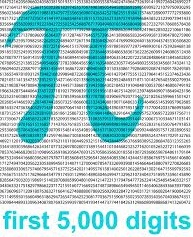All Irrational Numbers on Exams
You may see questions asking you to identify the characteristics of all irrational numbers on your algebra test.
Irrational Numbers – Exercises
Instructions: Simplify the algebraic expressions below as much as possible. Then state whether the result is a rational or irrational number. You may want to view the examples in the next section before attempting the exercise.1) 5π
2) 13 + \(\sqrt{2}\)
3) \(\sqrt{3} \times \sqrt{3}\)
4) \(\sqrt{3} + 7\)
5) \(\frac{1 \pm \sqrt{2}}{2}\)
6) \(\sqrt{3} + \sqrt{3}\)
7) \(\frac{2 \pm \sqrt{3}}{5}\)
8) 1 – \(\sqrt{3}\)
9) π ÷ 3
10) \(\sqrt{-1}\)
Irrational Numbers – Answers
1) The correct answer is: irrational5π is an irrational number. When π is multiplied by a rational number like 5, the result is irrational because it will have an infinite number of decimal places.
2) The correct answer is: irrational
13 + \(\sqrt{2}\)
13 + \(\sqrt{2}\) is an irrational number. When 13 is added to \(\sqrt{2}\), the result is irrational because it will have an infinite number of decimal places.
3) The correct answer is: rational
When simplified, we get 3, which is a rational number.
\(\sqrt{3} \times \sqrt{3} =\)
\(\sqrt{3}^2 = 3\)
4) The correct answer is: irrational
\(\sqrt{3} + 7\)
\(\sqrt{3} + 7\) is an irrational number. When 7 is added to \(\sqrt{3}\), the result is irrational because it will have an infinite number of decimal places.
5) The correct answer is: irrational
\(\frac{1 \pm \sqrt{2}}{2}\)
The result is irrational because when we multiply \(\sqrt{2}\) by one-half, there is an infinite number of decimal places.
6) The correct answer is: irrational
\(\sqrt{3} + \sqrt{3} = 2\sqrt{3}\)
The result is irrational because when we multiply \(\sqrt{3}\) by two, there is an infinite number of decimal places.
7) The correct answer is: irrational
\(\frac{2 \pm \sqrt{3}}{5}\)
We cannot simplify the result further without getting an infinite number of decimal places.
8) The correct answer is: irrational
1 – \(\sqrt{3}\)
We cannot simplify the result further without getting an infinite number of decimal places.
9) The correct answer is: irrational
p ÷ 3
We cannot simplify the result further without getting an infinite number of decimal places.
10) The correct answer is: neither rational or irrational
\(\sqrt{-1}\) is an imaginary number because we cannot multiply any real number by itself to get a negative number.
Irrational Numbers – Characteristics
An irrational number is the opposite of a rational number.
In other words, irrational numbers have these characteristics in common: they cannot be expressed as a fraction or as integers.
So, all irrational numbers have non-terminating, non-repeating decimals, when simplified.
Irrational Numbers – π and Square Roots
For example, π is an irrational number.
When expressed as a decimal, π goes to an infinite number of decimal places.
\(\sqrt{2}\) and \(\sqrt{3}\) go to an infinite number of decimal places when expressed as decimal numbers.
So, \(\sqrt{2}\) and \(\sqrt{3}\) are also irrational numbers.
Operations on π
When π is multiplied or divided by a rational number, or added to or subtracted from a rational number, the result is an irrational number.
That is because the result of any operation on π will go to an infinite number of decimal places.
Irrational Numbers – More Examples
Irrational numbers often result from using the quadratic formula or when working with square roots.
However, you always need to be sure that you simplify each expression as much as possible before deciding if the result is rational or irrational.
Look at the examples that follow.
Example 1:
State whether the following is a rational or irrational number.
\(\frac{1 \pm \sqrt{2}}{3}\)
Answer: Irrational
\(\frac{1 \pm \sqrt{2}}{3}\) is an irrational number because \(\sqrt{2}\) is an irrational number and this fraction cannot be simplified further.
Example 2:
Simplify the following. Then state whether the result is a rational or irrational number.
\(\frac{2}{\sqrt{2}} \times \frac{8}{\sqrt{2}}\)
Answer: Rational
\(\frac{2}{\sqrt{2}} \times \frac{8}{\sqrt{2}}\) is a rational number because it equals an integer, when simplified.
Study the proof below.
\(\frac{2}{\sqrt{2}} \times \frac{8}{\sqrt{2}} =\)
\(\frac{2 \times 8}{\sqrt{2} \times \sqrt{2}} =\)
\(\frac{16}{\sqrt{2}^2} =\)
\(\frac{16}{2} = 8\)
Example 3:
Simplify the following. Then state whether the result is a rational or irrational number.
\(\frac{3}{\sqrt{2}} + \frac{6}{\sqrt{2}}\)
Answer: Irrational
\(\frac{3}{\sqrt{2}} + \frac{6}{\sqrt{2}}\) is an irrational number because it has an infinite number of decimal places in the denominator.
Study the proof below.
\(\frac{3}{\sqrt{2}} + \frac{6}{\sqrt{2}} =\)
\(\frac{3 + 6}{\sqrt{2}} =\)
\(\frac{9}{\sqrt{2}}\)
You may want to review our posts on square roots, fractions, and the quadratic formula if you are not familiar with these concepts.
Further Algebra Practice
Irrational numbers should not be confused with imaginary numbers.
If you are taking an advanced algebra exam or college-level math placement test, you may also want to look at our posts on imaginary numbers.
You might also want to study our free algebra practice problems.
